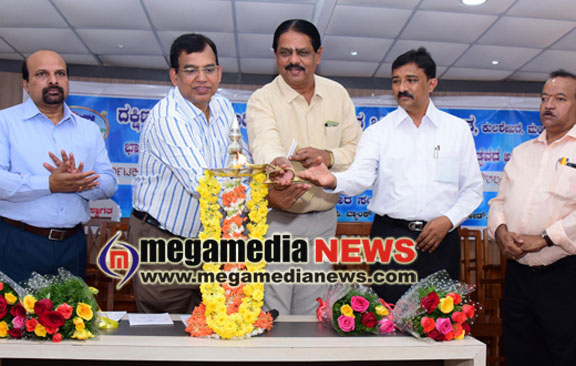Cattle breeding policy makes a start in the State : Dr Suresh Babu
1:19 PM, Sunday, November 27th, 2016 Mangaluru : In a bid to give further boost to breeding of cattle and also increase the production of milk in the state, the Department of Animal Husbandry and Veterinary Sciences has put forth a proposal for bio-security.
Mangaluru : In a bid to give further boost to breeding of cattle and also increase the production of milk in the state, the Department of Animal Husbandry and Veterinary Sciences has put forth a proposal for bio-security.
The proposal is expected to be passed by the Cabinet in December. Following the approval of the Cabinet, the proposal will be forwarded to the Centre. It may take a couple of years more for the project to be implemented, said Dr Suresh Babu, director (Animal Husbandry), at Karnataka Milk Federation (KMF).
He was addressing a gathering of officials of the Dakshina Kannada Co-operative Milk Producers’ Union Limited (DKMUL) and also artificial insemination (AI) technicians during a technical seminar on ‘Development of Breeding Policy of Cows and Buffalos in the State-2015 and Artificial Insemination’.
The seminar was organised on account of the 92nd birth anniversary of Dr Verghese Kurien at the auditorium of South Canara District Central Cooperative (SCDCC) Bank on Saturday.
Babu said the policy was mooted following an initiative in this regard by the Central government, emphasising on separate breeding policies for every States in the country. The state has been developing mixed breeds using the serum of holstein friesian (HF) and jersey breeds of cattle the last 40 years.
Following the incorporation of breeding policy in the later years, there are plans to breed indigenous cattle in Dakshina Kannada, Mysuru, Bengaluru, Kolar, Vijayapura and other districts.
The KMF has a set target of reaching the production of 1.20 crore kg milk a day by the year 2025. In the existing scenario, 72 lakh kg of milk is produced that is expected to touch 80 lakh kg by 2017-18, Babu added.
Babu wanted the lower-rung workers, mainly AI technicians, to hone their skills as they have a key role to play in the implementation of the project. He also cited the example of the western countries, where skilled technicians command great respect.
Plans are afoot to withdraw the existing single AI centres and promote AI centres at cluster levels to avoid financial implications on the exchequer. However, the cluster centres will come in more handy with mobile technicians attending to calls in and around their respective cluster centres in a jiffy, he said.
Simillar Posts
Warning: count(): Parameter must be an array or an object that implements Countable in /home/megamcaq/public_html/wp-content/plugins/post-plugin-library/common_functions.php on line 357
- None Found
Leave a Reply
© Copyright 2008 www.megamedianews.com All Rights Reserved. Privacy Policy








 Posted in
Posted in  Tags:
Tags: 



